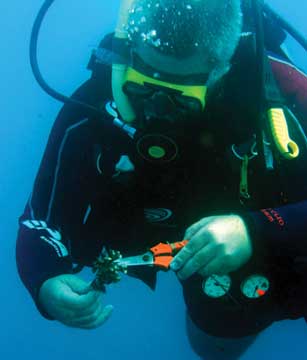|
NEWS NOTES
Biogeosciences
Chemicals worse for corals than oil
 Mel Cooper |
| Researchers collected coral fragments in the Red Sea to test for reactions to chemical dispersants used to clean up oil spills. They found the dispersants damaged corals more than the oil. |
Coral reefs have a rough life these days. Rising ocean temperatures and acidity threaten the marine organisms’ health, bottom trawlers dragging their heavy nets across the ocean floor rip their skeletons apart and every once in a while a tanker might spill some oil and contaminate the reefs. And the bad news keeps coming: A new study shows that the chemicals typically used to clean up oil spills harm corals even more than the oil does.
Shai Shafir of Israel’s National Institute of Oceanography and the Hebrew University of Jerusalem and his colleagues tested the impact of oil mixed with dispersants — chemicals that break down floating oil into tiny droplets — on corals. These oil dispersants are the method of choice for treating oil spills in tropical marine environments, Shafir says. The team, which reported their findings in the Aug. 1 Environmental Science & Technology, collected more than 10,000 coral fragments from four- to six-meter depths off the southern coast of Israel in the Red Sea. Back in the laboratory, they exposed these colonies to mixtures of seawater and crude oil, and to seawater-oil mixtures that each contained one of six different commercial dispersants. They found that the dispersant-containing mixtures were significantly more toxic to the two coral species they tested than the crude oil solutions, even at concentrations recommended by the manufacturer.
“Dispersants tend to get the oil off the sea surface and perhaps out of people’s minds, but that isn’t always the best thing for the environment,” says Gary Brewer of the U.S. Geological Survey in Kearneysville, W.Va. “All you are doing is dispersing the stuff and sinking it to a certain extent.”
Scientists have known for decades that oil dispersants are toxic, not only for corals but for other kinds of animals that live in the ocean as well, Brewer says. “There has been lots of concern about increased toxicity caused by dispersants and this study adds to this body of research.”
Coral reefs are one of the most diverse and productive marine ecosystems. Many major oil producers, such as Venezuela, Saudi Arabia and Kuwait, border tropical, coral reef-rich areas; many oil tankers cross these regions. This heavy maritime traffic is prone to accidents, Shafir says.
Dispersant manufacturers constantly try to come up with new, less harmful formulations, and Shafir and his team tested the latest generation of the chemicals. “We were surprised to find that all six dispersants were so toxic to corals,” he says. “We had hoped that the third generation of these dispersants would be more environmentally friendly.”
The study “is a red flag for decision-makers and managers,” Shafir says. “It shows the need to evaluate the situation carefully before automatically recommending the use of dispersants in the vicinity of coral reefs.” However, other threats, such as climate change, ocean acidification and destructive fishing practices, have far more potential for widespread damage to reefs than oil spills, Brewer adds.

 Subscribe
Subscribe


